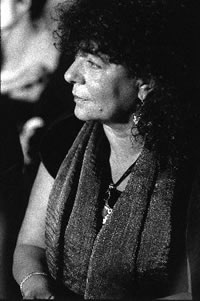 Infrequently I find myself browsing through a literary journal, and I come across something I hadn't seen before. And so it was with the Number 7 issue of Aufgabe, the Litmus Press literary journal out of Brooklyn, that regularly features works in translation, from the literature of Japan, Brazil, Mexico, and Morocco, as well as innovative American poetry. (I appeared in its pages some years ago.) My Chitown-area colleague, poet and critic Jennifer Scappetone, who teaches at the University of Chicago, guest-edited a section entitled "Ultima poesia"/"Italian Poetry Now," which is to say, contemporary innovative Italian poetry that would hardly be out of place--in translation--in a wide array of contemporary US reading venues, journals, classrooms, workshops. Jennifer has penned an introduction to the selection that helpfully situates this poetry in relation to current global and Italian poetics, noting in particular how the internet is providing new sources of inspiration, such as the Kootenay school, Flarf, and so on, though Italy's and Europe's literary traditions, Jennifer notes, also provide many starting points. Here, then, is a poem, by poet Maria Attanasio (1943-), new to me, that hasped my attention; it's from a group of poems that are excerpted from a larger work whose Italian title is Amnesia del movimento delle nuvole, which in English is Amnesia of the Movement of Clouds. This is only one of Attanasio's books; she is one of the leading lights of Sicilian and Italian writing, and a maestra not only of poetry, but of fiction as well, having won the 2007 Vittorini Prize for her historical novel Il falsario di Caltagirone. Notize e ragguagli sul curioso caso di Paolo Ciulla (2007). Here is how the Italian writer Vincenzo Consolo describes her in his narrative L'olivo e l'olivastro (1994), which I found on the Carte allineate: recensioni e testi blog:
Infrequently I find myself browsing through a literary journal, and I come across something I hadn't seen before. And so it was with the Number 7 issue of Aufgabe, the Litmus Press literary journal out of Brooklyn, that regularly features works in translation, from the literature of Japan, Brazil, Mexico, and Morocco, as well as innovative American poetry. (I appeared in its pages some years ago.) My Chitown-area colleague, poet and critic Jennifer Scappetone, who teaches at the University of Chicago, guest-edited a section entitled "Ultima poesia"/"Italian Poetry Now," which is to say, contemporary innovative Italian poetry that would hardly be out of place--in translation--in a wide array of contemporary US reading venues, journals, classrooms, workshops. Jennifer has penned an introduction to the selection that helpfully situates this poetry in relation to current global and Italian poetics, noting in particular how the internet is providing new sources of inspiration, such as the Kootenay school, Flarf, and so on, though Italy's and Europe's literary traditions, Jennifer notes, also provide many starting points. Here, then, is a poem, by poet Maria Attanasio (1943-), new to me, that hasped my attention; it's from a group of poems that are excerpted from a larger work whose Italian title is Amnesia del movimento delle nuvole, which in English is Amnesia of the Movement of Clouds. This is only one of Attanasio's books; she is one of the leading lights of Sicilian and Italian writing, and a maestra not only of poetry, but of fiction as well, having won the 2007 Vittorini Prize for her historical novel Il falsario di Caltagirone. Notize e ragguagli sul curioso caso di Paolo Ciulla (2007). Here is how the Italian writer Vincenzo Consolo describes her in his narrative L'olivo e l'olivastro (1994), which I found on the Carte allineate: recensioni e testi blog:seated at her computer like a Mena or Penelope at her loom, weaving a tender and amazing story about the seventeenth-century young and beautiful Francisca who, left a widow, dresses up as a man, transforms herself into farm-hand to work with the men in the countryside....(pp. 69-70)The snippets sounds even more majestic in the original Italian. But back to her poetry, where her attentiveness to language is on full display. Enjoy.
sentivo ogni giorno ...
Sentivo ogni giorno un indice destro
digitarmi ma no riuscii a decifrare
il tocco a spirale che accese
la dialettica dell'onda e del veliero
le ombre degli alberi contro il cielo di notte.
Fu sete guerra nucleo radioattivo
passando come un ruore d'acqua persa
tra gli strati di buio e di chiarore
la forma oscura che me dorme accanto
--ferita mai riscattata dalla storia. Un virus
risalì i circuiti cancellò la schermata.
I felt each day ...
I felt each day an index of the right hand
digitize me but I could not decipher
the spiral touch that turned on
the dialectic of wave and mast
the shadows of the trees against the night sky.
It was silk war radioactive nucleus
passing by like a noise of water lost
between layers of darkness and glimmering
the obscure form that sleeps next to me
--wound never redeemed by history. A virus
reclimbed the circuits erased the screen.
Translated by Carla Billitteri.
Copyright © Maria Attanasio, Litmus Press, from Aufgabe Number 7, 2008. All rights, reserved.
You can see Maria Attanasio, Jennifer, and a host of other Italian poets at two different events sponsored by Poets House in NYC this May.









No comments:
Post a Comment